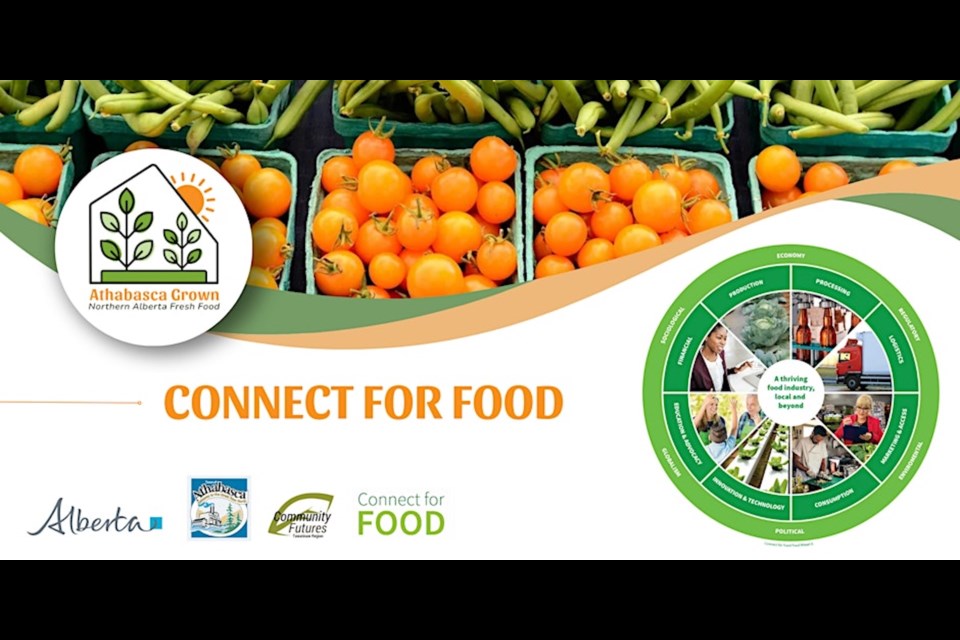ATHABASCA — Calling all Athabascans: are you interested in local, sustainable food? Want to learn more about real opportunities for innovative community development and job creation in your own backyard?
Dr. Mike Gismondi, a pillar of the Athabasca community, along with a team of Athabasca University (AU) researchers and experts, is inviting anyone who answered ‘yes’ to a series of informative workshops scheduled over the next six months, with the first slated for Jan. 18.
This Saturday, attendees will gather in the Seniors Centre to hear a presentation from Alberta Agriculture and Irrigation’s Eileen Kotowich on local food ecosystems, and engage in a reflective discussion facilitated by Keleigh Cormier, co-founder of Connect for Food, an Alberta-based advocate for “growing what we eat, and eating what we grow.”
“We’re pretty excited to be bringing these presenters to town,” Cara Shan, AU researcher and project co-lead along with Gismondi, told town councillors during their Jan. 7 meeting.
Shan and Gismondi filled councillors in on their plans for the series, which is part of a feasibility study on using passive solar greenhouses to stretch the growing season in Athabasca, work that can be replicated in other Northern Alberta communities.
Passive solar greenhouses are growing environments that don’t need any additional energy input aside from natural sunlight. Passive greenhouses utilize structure orientation, materials that store and release heat, and specific insulation and glass glaze to optimize growing conditions year-round.
Last year, councillors opted to support Gismondi and Shan’s efforts by applying to the Alberta government’s Small Community Opportunity Program, and in June the municipality received a grant of $90,000 to pursue the feasibility study.
An additional $10,000 from AU and $22,500 from Mitacs, an academic research funding body, enabled the team to hit the ground running.
Gismondi and Shan travelled to established passive solar greenhouses around the country to learn more about best practices and lessons learned as part of their research, hitting facilities in Olds, Alta., Invermere, B.C, and Halifax, N.S.
Now, the team is ready to hone in on the local context, and the upcoming workshop series is designed to get Athabascans from every spoke of the ‘food wheel’ — from growers and consumers to sellers and educators — thinking critically about sustainable food systems, agri-tourism, and creating innovative opportunities in rural communities.
“We’re having these conversations, keeping the dialogue open, and doing research on the side as to, specifically in Athabasca, what are the community assets, what are the potential locations, what is the market assessment, and what are the extended impacts?” said Shan.
Individuals interested in attending the Jan. 18 Connect for Food workshop can register ahead of time on Eventbrite or at athabascagrown.ca. The research team, along with co-host Community Futures – Tawatinaw Region, will be providing a light lunch before the session begins.
Due to a high volume of interest, general registration for the Jan. 18 workshop has closed, but anyone interested can still join the waiting list, and spaces are still available for individuals with roles in food business.
Athabascans can also register online for the upcoming workshops in order to secure a spot ahead of time. February will see the Athabasca and District Ag Society co-host expert groups speaking on future-forward farming and repairing the cognitive rift between farm and table.
Subsequent workshops will touch on what a passive solar greenhouse could look like in Athabasca, the entrepreneurial opportunities available to locals, and how to create and foster connections to build a resilient, community-centric food system.
Additional co-hosts for upcoming workshops include the Town of Athabasca, Athabasca University RAIC Centre for Architecture, Athabasca – Science Outreach, and Athabasca County Economic Development.
“That’s a nice way to tie it into the existing networks in town,” said Shan.
As well as the workshops, an online survey will be launched in the coming weeks, and Shan and other researchers will continue engaging in formal and informal discussions with community members and stakeholders, local grocers, Indigenous and Hutterite communities, and even high school students as part of the project.
The feasibility study is expected to be finished in the fall of 2025 in advance of the Alberta government’s Dec. 31 2025 deadline for project reporting. To learn more about the Athabasca Grown project and upcoming events, visit athabascagrown.ca.
“I’m glad to be doing something that’s not as an academic, more as just what I like doing — community development,” said Gismondi.
“I think we’ll do you proud, make you proud of the work,” he added. “The next step is looking for money, the capital money, and you gotta find some young people that want to do this — people younger than me, which shouldn’t be hard.”


